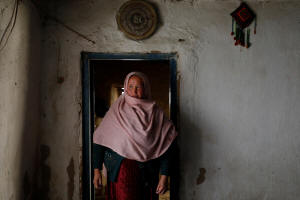Young Afghan women train as midwives for out-of-reach villages
 Send a link to a friend
Send a link to a friend
 [March 07, 2023]
By Mohammad Yunus Yawar and Charlotte Greenfield [March 07, 2023]
By Mohammad Yunus Yawar and Charlotte Greenfield
FOLADI VALLEY, Afghanistan (Reuters) - In a small village circled by
velvety white snow-topped mountains in Afghanistan's Bamiyan province,
Aziza Rahimi mourns the baby son she lost last year after a harrowing
birth with no medical care.
"It was too hard for me when I lost my baby. As a mother, I nurtured the
baby in my womb for nine months but then I lost him, it is too painful,"
said Rahimi, 35.
The village's rugged and remote beauty in Bamiyan's Foladi Valley comes
with deadly barriers for pregnant mothers. A narrow road to the village
with few vehicles is sometimes cut off by snow, severing a lifeline to
hospitals, clinics and trained health workers.
However, a potentially life-saving improvement is on the way. Rahimi's
village is one of several around Bamiyan that have sent 40 young women
to train for two years as midwives in the provincial capital, after
which they will return home.

Isolation can become a death sentence in any difficult birth, doctors
and aid workers say, contributing to Afghanistan's extremely high
maternal and infant mortality rates, among the worst in the world.
The United Nations estimates an Afghan woman dies every two hours during
pregnancy and childbirth, making Afghanistan's maternal mortality rate
the highest in Asia.
The trainee midwife programme has been spearheaded by the U.N. refugee
agency (UNHCR) with the Watan Social and Technical Services Association,
a local charity. They hope to expand the programme, which also takes
place in neighbouring Daikundi province.
Since taking over in 2021, Taliban authorities have barred women from
universities and most charity jobs, but they have made exemptions in the
healthcare sector and UNHCR says local health authorities are supportive
of the project.
DONKEYS
"When the roads are blocked of course there is no means of
transportation, people even use donkeys to move patients to the clinic
centres, but sometimes there is not even the opportunity for that," said
Mohammad Ashraf Niazi, the head of UNHCR's Bamiyan office.

[to top of second column]
|

Aziza Rahimi, 35, who lost her son at
birth, walks inside her house in Foladi Valley in Bamiyan,
Afghanistan, March 2, 2023. REUTERS/Ali Khara
 Rahimi, who has five other children,
said riding a donkey was out of the question when she was jolted by
pain while nine months' pregnant in the middle of the night four
months ago. Stumbling, bleeding, for two hours to her in-laws' house
after her husband was unable to find a car or ambulance to take them
to hospital, she gave birth there.
The baby died shortly after. Too late, an ambulance arrived.
Women giving birth experience a very different situation in
Bamiyan's main city hospital where the trainee midwives work
alongside staff, and with the help of a trainer learn how to assess
and guide pregnant women, deliver babies and provide post-partum
care.
"We want to learn and serve the people of our village," said one
23-year-old trainee, who walks two hours each day to the hospital.
UNHCR asked the trainees not be named for safety.
In one small hospital clinic, with dozens of women waiting outside,
a trainee midwife guides a woman with the help of a book of images
on what to expect to prepare for birth under the watchful eye of two
trained healthworkers.
Any women with risks of complications are admitted to a maternity
ward in a nearby building where another trainee midwife takes the
blood pressure of a pregnant patient suffering from an infection.
She checks regularly on a woman who gave birth six hours earlier,
her baby daughter nestled by her side.

Many of the trainee midwives, some with small children of their own,
have faced logistical and financial challenges, often having to
travel huge distances, or live far from home to attend the programme.
"At first, I didn't want to study nursing or to be a midwife, but
after I faced problems and pains during my pregnancy, I got a desire
to study midwifery," said a 20-year old trainee, the mother of an
18-month old son who struggled to access care in her village. She
said many women and families in remote areas did not have the
information and support they needed to prepare for a safe delivery.
"We have to change such kind of thoughts ... I want to go to remote
areas to treat women who face problems."
(Reporting by Charlotte Greenfield and Mohammad Yunus Yawar in
Bamiyan; Editing by Andrew Cawthorne)
[© 2023 Thomson Reuters. All rights
reserved.]This material may not be published,
broadcast, rewritten or redistributed.
Thompson Reuters is solely responsible for this content. |